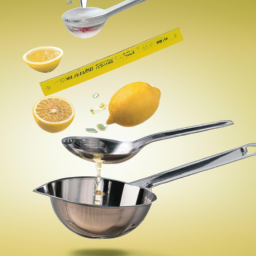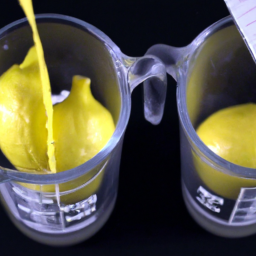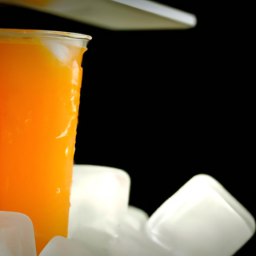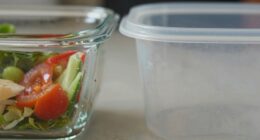In the world of cooking and baking, lemon juice is commonly used to add a burst of flavor to different recipes. However, it can be frustrating when you cut into a lemon and find that there isn’t much juice. As someone who loves using lemon in my dishes, I have always wondered how much juice you can expect from a single lemon.
After doing some research, I’ve learned that there are several factors that can affect lemon juice production, such as the variety of lemon, its ripeness, and even the temperature of the fruit.
In this article, I’ll explore these factors and provide tips for maximizing lemon juice extraction. I’ll also share some delicious lemon juice recipes and discuss the nutritional benefits of this citrus fruit.
Whether you’re a seasoned chef or a novice cook, understanding how much juice you can expect from a lemon can help you plan your recipes and avoid any disappointments in the kitchen. So, let’s dive in and explore the world of lemon juice production!
Key Takeaways
- A lemon yields enough liquid to fill a tablespoon and a half.
- Lemon juice production is affected by variety, ripeness, and temperature.
- A fresher and higher quality lemon yields more juice.
- A ripe, room temperature lemon yields more juice than a cold, unripe one.
Factors that Affect Lemon Juice Production
There’s a lot of variation in how much juice you can get from one lemon depending on factors like lemon quality, ripeness, temperature, and squeezing techniques. For instance, a fresher and higher quality lemon will produce more juice than a lower quality one.
Additionally, a lemon that is fully ripe and at room temperature will yield more juice than a cold, unripe lemon. Squeezing technique can also play a significant role in how much juice you can get from a lemon. Using a manual juicer or reamer that applies pressure evenly across the lemon can yield more juice than simply squeezing it by hand.
Moreover, rolling the lemon on a hard surface before juicing can help break down the cell walls and release even more juice. With all these factors in mind, let’s take a closer look at how much juice one lemon typically produces on average.
How Much Juice Does One Lemon Produce on Average?
On average, a lemon yields enough liquid to fill a tablespoon and a half, providing a tangy burst of flavor to any dish. When I think of the juice from one lemon, I imagine a bright yellow fruit with a thin skin and juicy pulp.
Here are some nested bullet points to create a vivid picture in your mind:
- Imagine slicing a lemon in half and squeezing it in your hand.
- The juice trickles down your fingers and onto the cutting board.
- You can see the tiny seeds and pulp floating in the juice.
- The aroma of freshly squeezed lemon fills the air.
While lemon squeezing techniques can vary, the average yield is consistent. Of course, the amount of juice you can extract from a lemon depends on its size, ripeness, and juiciness.
If you don’t have a fresh lemon on hand, there are lemon juice substitutes that can be used in a pinch. However, nothing beats the flavor of freshly squeezed lemon juice.
In the next section, I’ll share some tips for maximizing lemon juice extraction.
Tips for Maximizing Lemon Juice Extraction
To get the most out of your lemon, try gently rolling it on the counter before slicing it open and squeezing it. This helps to break down the lemon’s fibers and release more juice. You can also use a lemon squeezer or a citrus press to extract as much juice as possible. These tools are designed to apply pressure evenly, ensuring that you get every last drop of juice.
Another way to maximize your lemon juice extraction is to zest the lemon before juicing it. The oils in the lemon’s skin contain a lot of flavor, and adding some zest to your recipe can make a big difference. To zest a lemon, use a microplane or a zester to grate off the yellow skin. Be careful not to grate too deeply, as the white pith underneath can be bitter.
With these tips, you can get the most juice and flavor out of your lemons and make your recipes even more delicious.
When it comes to storing lemons for maximum juice production, there are a few things to keep in mind.
How to Store Lemons for Maximum Juice Production
For optimal lemon juice extraction, you’ll want to store your lemons in the refrigerator in a plastic bag or container with some air holes. This lemon storage technique can help preserve the quality and quantity of juice produced by the fruit.
When lemons are exposed to air, they start to dry out and lose their juice. Refrigeration helps to slow down this process and maintain the moisture content of the fruit.
Another lemon juice preservation method is to avoid storing lemons in direct sunlight or at room temperature for long periods. This can cause the fruit to become soft and overripe, which can affect the quality and yield of the juice.
By keeping your lemons properly stored, you can ensure that they are at their best for juicing. In the next section, I’ll share some tips on how to tell if a lemon is ripe and ready to use.
How to Tell if a Lemon is Ripe
Determining the ripeness of a lemon can be tricky, but a good indicator is its firmness. When selecting a lemon, gently squeeze it to feel for a slight give. A ripe lemon should have a little bit of give, but it should not be too soft. Additionally, a ripe lemon will have a bright yellow color and a glossy skin.
Harvesting techniques can also affect the ripeness and flavor profile of a lemon. Lemons that have been left on the tree for too long can become overripe and lose their flavor. On the other hand, lemons that are picked too early can be underripe and lacking in flavor. It is best to harvest lemons when they are fully ripe for the best flavor profile.
When it comes to using lemons for juice, it is important to use ripe lemons for maximum juice production. In the next section, we will explore other uses for lemon juice beyond just cooking and baking.
Other Uses for Lemon Juice
Did you know that lemon juice can be used for more than just cooking? One of the most surprising uses of lemon juice is that it can naturally lighten hair. When lemon juice is applied to hair and exposed to sunlight, the citric acid in the juice reacts with the sun’s rays to lighten the hair. However, it’s important to note that this method can be drying to the hair, so it’s best to use a deep conditioning treatment afterwards.
Aside from its hair lightening properties, lemon juice can also be used for cleaning and in cocktails. When mixed with vinegar and baking soda, lemon juice can be used to clean and deodorize household surfaces. It’s also a popular ingredient in cocktails, adding a tangy, citrusy flavor to drinks like margaritas and mojitos.
With its versatility, lemon juice is truly a kitchen staple that can be used in a variety of ways. Speaking of cocktails, there are countless lemon juice recipes to try. From lemon drop martinis to lemonade, the possibilities are endless. So why not experiment with lemon juice and see what delicious concoctions you can come up with?
Lemon Juice Recipes
You’re missing out on a world of flavor if you haven’t tried adding a splash of lemon juice to your favorite recipes, like zesty lemon chicken or tangy lemon vinaigrette – it’s like adding a burst of sunshine to your dish!
But did you know that lemon juice can also be used in cocktails and marinades? Lemon juice adds a bright, refreshing flavor to drinks like lemon drop martinis, and can tenderize meat in a marinade. When mixed with oil, garlic, and herbs, lemon juice can create a delicious marinade for chicken or fish.
In addition to its culinary uses, lemon juice also has health benefits. It’s a good source of vitamin C, which is important for a healthy immune system. Lemon juice can also aid in digestion and promote detoxification.
So next time you’re cooking or mixing drinks, don’t forget to add a splash of lemon juice for both flavor and health benefits.
When it comes to using lemon juice, the type of lemon you use can make a difference in the flavor of your dish or drink. Let’s explore the different varieties of lemons and their unique qualities.
Lemon Varieties
Get ready to discover a whole new world of flavor with different varieties of lemons. From the sweet Meyer lemon to the tangy Eureka lemon, each one has its own unique characteristics that make it perfect for different dishes and drinks.
The Meyer lemon, for example, has a sweeter taste and lower acidity levels than other varieties, making it ideal for desserts and cocktails. On the other hand, the Eureka lemon has a more tart flavor and higher acidity levels, making it perfect for savory dishes and marinades.
When it comes to lemon juice, the acidity levels can vary depending on the variety of lemon used. For example, the juice from a Eureka lemon will have a higher acidity level than the juice from a Meyer lemon. This is important to keep in mind when using lemon juice in recipes, as it can affect the overall flavor and balance of the dish.
By understanding the differences between lemon varieties and their acidity levels, you can choose the perfect lemon for your recipe and create a dish that is bursting with flavor.
As we move onto the next section about lemon juice nutritional benefits, it’s important to note that the type of lemon used can also affect the nutritional content of the juice. But before we dive into that, let’s take a closer look at the benefits of incorporating lemon juice into your diet.
Lemon Juice Nutritional Benefits
Discover the amazing nutritional benefits of incorporating lemon juice into your diet, including improved digestion, boosted immune system, and glowing skin. Lemon juice is a great source of vitamin C, which is essential for a healthy immune system.
Vitamin C also helps the body absorb iron from plant-based foods, making it an important nutrient for vegetarians and vegans. In addition, lemon juice can act as a natural detoxifier for the body. It helps to flush out toxins and waste, promoting healthy digestion and preventing constipation.
Drinking lemon juice in the morning can also aid in weight loss, as it helps to boost metabolism and reduce appetite. Incorporating lemon juice into your diet is an easy and delicious way to improve your overall health and wellbeing.
Frequently Asked Questions
Can I use bottled lemon juice instead of freshly squeezed juice?
Did you know that bottled lemon juice can contain added preservatives and less nutritional value than freshly squeezed juice? While it may be a convenient alternative, for optimal health benefits and taste, I recommend using freshly squeezed juice.
How long does it take to juice a lemon by hand?
Hand juicing techniques vary in efficiency depending on the individual’s skill and the juicing equipment used. On average, it takes me about 2-3 minutes to juice one lemon by hand, using a manual citrus juicer.
Is there a difference in the amount of juice produced from organic vs. non-organic lemons?
When comparing organic vs. non-organic lemons, there is no significant difference in juice yield. However, the lemon juice extraction technique can affect the amount of juice produced. Scientific studies have shown that using a hand juicer produces more juice than squeezing by hand.
Can I freeze leftover lemon juice for later use?
Yes, I freeze leftover lemon juice for later use. It maintains its quality for up to 4 months. Freezing lemon juice is a good way to preserve its vitamin C content. Thaw it in the fridge before use.
What is the best way to clean a lemon before juicing it?
To clean a lemon before juicing, I recommend using a vegetable brush and warm water to scrub the surface. To extract the most juice, roll the lemon on a hard surface before squeezing. Avoid over-squeezing to prevent bitterness.
Conclusion
So, how much juice can you get from one lemon? The answer is not straightforward as it depends on various factors such as ripeness, size, and juicing technique.
On average, a lemon produces around 2-3 tablespoons of juice, but this can vary widely. To maximize juice extraction, it’s important to choose ripe lemons, roll them on a hard surface to break down the membranes, and use a juicer or hand-squeeze method. Proper storage of lemons can also increase their juice production.
Lemon juice is not only a flavorful addition to recipes, but it also has numerous health benefits. With its high vitamin C content and antioxidant properties, lemon juice can boost the immune system and improve digestion.
So, next time you reach for a lemon, remember to squeeze it for all it’s worth and enjoy the many benefits it has to offer.









